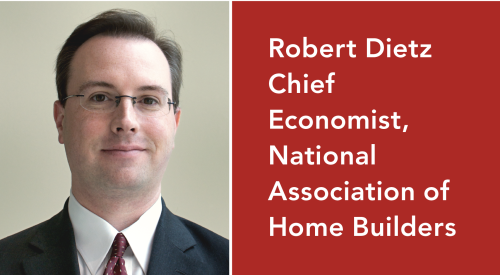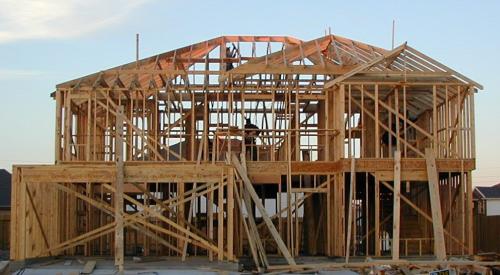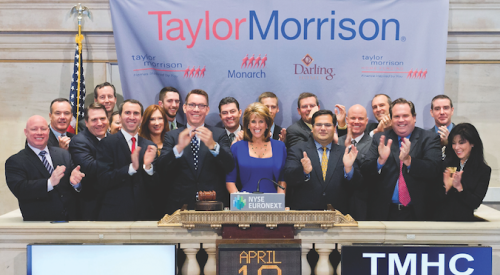What a difference a few weeks makes. Throughout the summer and fall, confidence in a booming economy remained palpable among builders. Then came indications the economy is slowing faster than predicted—a growth rate of 2% during the second and third quarters versus the 4.5% clip of previous periods. Add a stock market that gave back all of its gains in 2000 and an incoming President mentioning "a risk of recession" and you have the makings of a huge psychological pivot. That is where many builders are as 2001 gets underway: hopeful but guarded.
These days it is difficult to separate the truth of a strong economy that is slowing from the rising buzz that perhaps something worse is happening. To hear major news organizations tell it, builders—or any business that sells long-term, durable goods—should be resigned to a period of negative growth. The truth is, no major economist is predicting a recession for any point this year or next.
Then there is the historical perspective. Even the most pessimistic forecasts for housing starts this year—at or slightly above 1.5 million—is higher than previous peak years. Better still, economists agree that many areas of the country—notably the West, parts of the Northeast, Texas and Florida—will experience strong housing growth in 2001. Depending on where you build and, to a lesser degree, for whom, the slower growing economy will be felt differently, NAHB economist David Seiders recently told a group of builders.
Stock Market Impact
Joe Cristo, president of Cristo Homes in Middleton, Ohio, is a perfect case in point. Serving a small market in the industrial Midwest where growth is expected to be slower than most places, he may have a right to worry. He built 110 homes in 2000, and going into this year has a carryover of 30 contracts. But low sales traffic amplified by cold and snowy weather will certainly have a negative impact on his first quarter.
"We have been on one hell of a hot streak," notes Cristo, "but I am concerned about a slowdown this year more than any previous year."
Working in Cristo’s favor is his company’s focus on first-time buyers, say the experts. As a group, they are less likely to own stock and therefore feel the impact of recently erased stock market gains. Not so for builders who have notched big profits serving affluent buyers.
Steve Zales, an executive vp with The O’Brien Group in San Mateo, Calif., says that despite the decline and fall of many Internet millionaires, 2001 will be a good one for builders in the Bay Area. He points to figures that show an abundance of "good, high paying jobs, a shortage of housing and declining mortgage rates."
According to Zales, softness in the Bay Area will only be felt in prices. This is not unexpected, he says, after a five-year period where new home prices in some places appreciated 200% to 250%.
Jobs, Consumer Confidence
When looking ahead, Stewart Cline, president of Giant Morrison Homes, Atlanta, is like most builders: he relies heavily on projections of local job growth figures. In 2000, Morrison built more than 400 homes in the Atlanta area at a time when 110,000 new jobs were created. This year, partly on the basis of an acquisition, he expects to increase closings by 50% even though job creation will likely fall below 50,000, say researchers at Georgia State University. "The challenge," he says, "will be gaining market share with a shrinking base of buyers."
On a national basis, the NAHB’s Michael Carliner says job growth is projected to be a tepid 1.1% in 2001, down from previous gains of 2.3% in 1999 and 2.1% in 2000.
Even Las Vegas, which grew faster than any other city in recent years, will not create the number of new jobs it did last year, says Tom McCormick, president of Astoria Homes. The reason, he says, is a temporary lull in casino construction. No major resorts are scheduled to open until 2002. "It is still a healthy place," he says, "it’s just that our big job creator is not as strong in 2001."
Building homes for the full range of buyers, with models ranging from 650 to 6100 square feet, Astoria is looking to push its total to almost 500 closings in 2001. From a buyer segment perspective, the biggest area of concern is move-up homes. "We are very worried about consumer confidence and so we are cautious about this year, notes McCormick.
In the New York City metro area, Mitch Hochberg, president of high-end Giant Spektrum Skanska, Valhalla, N.Y., is also focused on consumer confidence. He feels job growth statistics are of little importance in a market area with almost 100% employment and a vast base of high-income professionals.
Hochberg is optimistic about 2001 for three reasons: sales during the fourth quarter of 2000 were "atypically" higher than usual; consumer confidence remains at historically high levels despite some recent falling off; and there continues to be an undersupply of new homes within an hour’s commute to Manhattan, an area where Spektrum builds 70% of its homes.
If Hochberg is right, the real importance of the aggressive half-point reduction in the Federal Reserve’s discount rate on Jan. 3 will be less its eventual impact on mortgage rates, than the positive psychological signal it will send to consumers. And that will be a pivot in the right direction.











